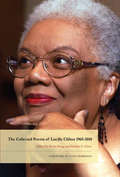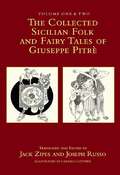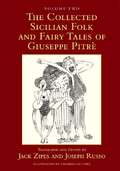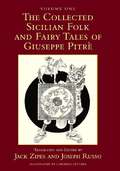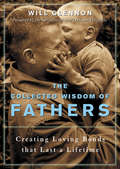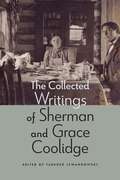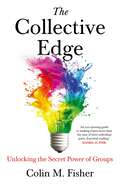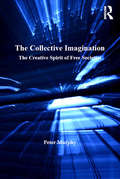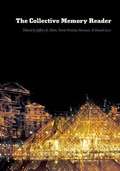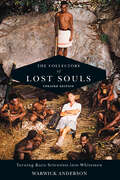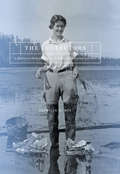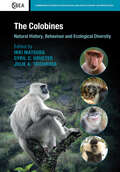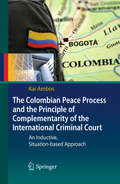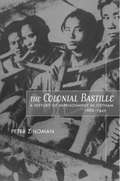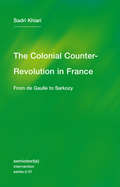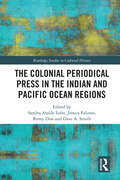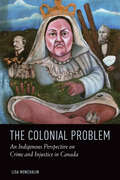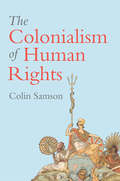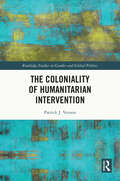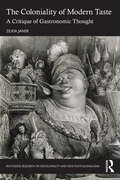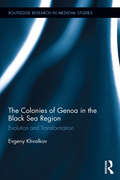- Table View
- List View
The Collected Poems of Lucille Clifton 1965-2010 (American Poets Continuum)
by Lucille CliftonWinner of the 2013 Hurston/Wright Legacy Award for Poetry"The Collected Poems of Lucille Clifton 1965-2010 may be the most important book of poetry to appear in years."--Publishers Weekly"All poetry readers will want to own this book; almost everything is in it."--Publishers Weekly"If you only read one poetry book in 2012, The Collected Poems of Lucille Clifton ought to be it."-NPR"The 'Collected Clifton' is a gift, not just for her fans...but for all of us."--The Washington Post"The love readers feel for Lucille Clifton-both the woman and her poetry-is constant and deeply felt. The lines that surface most frequently in praise of her work and her person are moving declarations of racial pride, courage, steadfastness."-Toni Morrison, from the ForewordThe Collected Poems of Lucille Clifton 1965-2010 combines all eleven of Lucille Clifton's published collections with more than fifty previously unpublished poems. The unpublished poems feature early poems from 1965-1969, a collection-in-progress titled the book of days (2008), and a poignant selection of final poems. An insightful foreword by Nobel Prize-winning author Toni Morrison and comprehensive afterword by noted poet Kevin Young frames Clifton's lifetime body of work, providing the definitive statement about this major America poet's career.On February 13, 2010, the poetry world lost one of its most distinguished members with the passing of Lucille Clifton. In the last year of her life, she was named the first African American woman to receive the $100,000 Ruth Lilly Poetry Prize honoring a US poet whose "lifetime accomplishments warrant extraordinary recognition," and was posthumously awarded the Robert Frost Medal for lifetime achievement from the Poetry Society of America."mother-tongue: to man-kind" (from the unpublished the book of days):all that I am asking isthat you see me as somethingmore than a common occurrence,more than a woman in her ordinary skin.
The Collected Sicilian Folk and Fairy Tales of Giuseppe Pitré
by Giuseppe PitreGiuseppe Pitrè, a nineteenth-century Sicilian physician, gathered an enormous wealth of folk and fairy tales as he traveled and treated the poor throughout Palermo. He also received tales from friends and scholars throughout the island of Sicily. A dedicated folklorist, whose significance ranks alongside the Brothers Grimm, he published a 25-volume collection of Sicilian folk tales, legends, songs, and customs between 1871 and 1914. Though first published in their original Sicilian dialect, these tales have never before been translated, collected, and published in English until now. This historic two-volume set collects 300 and 100 variants of his most entertaining and most important folk and fairy tales, along with lively, vivid illustrations by Carmelo Lettere. In stark contrast to the more literary ambitions of the Grimms' tales, Pitré’s possess a charming, earthy quality that reflect the customs, beliefs, and superstitions of the common people more clearly than any other European folklore collection of the nineteenth century. Edited, translated, and with a critical introduction by world-renowned folk and fairy tale experts Jack Zipes and Joseph Russo, this collection will firmly establish Pitrè’s importance as a folklorist.
The Collected Sicilian Folk and Fairy Tales of Giuseppe Pitré
by Jack Zipes Joseph RussoThis two-volume set collects 300 of the most entertaining and important folk and fairy tales of Giuseppe Pitré, a nineteenth century Sicilian folklorist whose significance ranks alongside the Brothers Grimm. In stark contrast to the more literary ambitions of the Grimms' tales, Pitré’s possess a charming, earthy quality that reflect the customs, beliefs, and superstitions of the common people more clearly than any other European folklore collection of the 19th century. Edited, translated, and with a critical introduction by world-renowned folk and fairy tale experts Jack Zipes and Joseph Russo, this is the first collection of Pitré’s tales available in English. Carmelo Letterer's illustrations throughout the volume are as lively and vivid as the stories themselves, illuminating the remarkable imagination captured in the tales.
The Collected Sicilian Folk and Fairy Tales of Giuseppe Pitré
by Jack Zipes Joseph RussoThis two-volume set collects 300 of the most entertaining and important folk and fairy tales of Giuseppe Pitré, a nineteenth century Sicilian folklorist whose significance ranks alongside the Brothers Grimm. In stark contrast to the more literary ambitions of the Grimms' tales, Pitré’s possess a charming, earthy quality that reflect the customs, beliefs, and superstitions of the common people more clearly than any other European folklore collection of the 19th century. Edited, translated, and with a critical introduction by world-renowned folk and fairy tale experts Jack Zipes and Joseph Russo, this is the first collection of Pitré’s tales available in English. Carmelo Letterer's illustrations throughout the volume are as lively and vivid as the stories themselves, illuminating the remarkable imagination captured in the tales.
The Collected Wisdom of Fathers: Creating Loving Bonds that Last a Lifetime
by Will GlennonThe bestselling author encourages and supports men in building a bridge to their children by relating the real-life experiences of hundreds of fathers.The Collected Wisdom of Fathers is an original and poignant collection of true stories and suggestions that provides fathers with the essential tools and advice they need. By passing on important lessons others fathers have learned in their own journeys, from staying connected even when physically separated, to listening in ways that allow children to know they are being heard, to simply showing deep love and respect. The Collected Wisdom of Fathers is an original and inspirational book for fathers everywhere.Praise for Will Glennon’s 200 Ways to Raise a Boy’s Emotional Intelligence“Will sees our boys as they are: complex, infinitely interesting, and capable of great strength—but only if their emotional complexity is respected.” —Richard Louv, international bestselling author of Last Child in the Woods“Stuffed full of practical tips for teachers and parents alike . . . [that] will help you connect with, empower, and uplift the young men in your life.” —Becca Anderson, author of Badass Affirmations“Will Glennon’s simple, straightforward definitions of the problems facing parents, teachers, and boys and his practical solutions help us all find our way through the often bewildering maze that lies between the limiting cultural stereotypes and the full potential of the human male.” —Don and Jeanne Elium, authors of Raising a Son
The Collected Writings of Assia Wevill
by Julie Goodspeed-Chadwick and Peter K. SteinbergThe Collected Writings of Assia Wevill marks a significant development in literary recovery efforts related to Assia Wevill (1927–1969), who remains a critically important figure in the life and work of the Pulitzer Prize–winning poet Sylvia Plath and the British Poet Laureate Ted Hughes. Editors Julie Goodspeed-Chadwick and Peter K. Steinberg located over 150 texts authored by Assia Wevill and curated them into a collected scholarly edition of her letters, journals, poems, and other creative writings. These documents chronicle her personal and professional lives, her experiences as a single working mother in 1960s London, her domestic life with Hughes, and her celebrated translations of poetry by Yehuda Amichai. The Collected Writings of Assia Wevill offers an invaluable documentary resource for understanding a woman whose life continues to captivate readers and scholars.
The Collected Writings of Sherman and Grace Coolidge
by Sherman Coolidge Grace CoolidgeSherman and Grace Coolidge were a remarkable couple in many respects. Sherman Coolidge (Runs On Top), born in the early 1860s into the Northern band of Arapahos, experienced the extreme violence of the Indian Wars, including the death of his father, as a young boy. Grace Wetherbee Coolidge was born into wealth and privilege in 1873, only to reject her life as a New York heiress and become a missionary on the Wind River Reservation in Wyoming. It was there that Sherman and Grace met and later married in 1902. After eight years together at Wind River, both went on to achieve prominence: Sherman as the president of the Native-run reform group the Society of American Indians (1911–1923), Grace as the author of Teepee Neighbors, a book describing her time on the reservation that drew praise from critics such as H. L. Mencken. Sherman was an Episcopal priest and a mesmerizing speaker who had the unique ability to blend his assimilated Western perspective with Arapaho values to educate the American public about the significant challenges facing Native peoples, including endemic poverty, racism, and inequality. Offering unprecedented entrée into the most significant writings and documents of a leading Native American advocate and his wife, this volume is an intimate portrait of their life and contributes to our understanding of American Indian activism at a key moment of Indigenous resurgence against the settler state.
The Collective Edge: Unlocking the Secret Power of Groups
by Colin M. Fisher&‘Essential reading for creators, builders, and leaders&’DANIEL H. PINK, author of Drive &‘A deep dive into the dynamics of successful teams&’ADAM GRANT, author of Think Again &‘A phenomenal, science-backed guide&’KATY MILKMAN, author of How to Change We live in an age of unprecedented individualism. We seek individualistic solutions to our problems, but we can rarely explain failures and successes by looking at one person&’s actions, or fix things entirely on our own. Our lives are shaped by groups as wide-ranging as work teams, friends and families, nationalities and religions, and our tendency toward cooperation is the foundation of human accomplishment. Nearly every scientific discovery, world-changing business, desert island musical album and legendary sports team has a great group at its core. In his revelatory book, Dr Colin Fisher, a foremost expert on group dynamics, demonstrates how to harness the amazing power of groups to achieve great things under the right conditions. Fisher skilfully weaves together the latest science with vivid storytelling. He demonstrates how to build happy groups that cooperate effectively, how to harness the motivating power of competition without getting embroiled in conflict and avoid the pitfalls of conformity. The Collective Edge is a ground-breaking book that will transform your understanding of human behaviour. Whether you want to change yourself, your team, or the world, you need to work with the invisible forces of group dynamics, rather than being unwittingly pushed around by them. By doing so you can learn to make better decisions, form happier groups that are more than the sum of their parts, and improve the quality of your interactions with others – forever changing how you live and work for the better.
The Collective Imagination: The Creative Spirit of Free Societies
by Peter MurphyThe Collective Imagination explores the social foundations of the human imagination. In a lucid and wide-ranging discussion, Peter Murphy looks at the collective expression of the imagination in our economies, universities, cities, and political systems, providing a tour-de-force account of the power of the imagination to unite opposites and find similarities among things that we ordinarily think of as different. It is not only individuals who possess the power to imagine; societies do as well. A compelling journey through various peak moments of creation, this book examines the cities and nations, institutions and individuals who ply the paraphernalia of paradoxes and dialogues, wry dramaturgy and witty expression that set the act of creation in motion. Whilst exploring the manner in which, through the media of pattern, figure, and shape, and the miracles of metaphor, things come into being, Murphy recognises that creative periods never last: creative forms invariably tire; inventive centres inevitably fade. The Collective Imagination explores the contemporary dilemmas and historic pathos caused by this-as cities and societies, periods and generations slip behind in the race for economic and social discovery. Left bewildered and bothered, and struggling to catch up, they substitute empty bombast, faded glory, chronic dullness or stolid glumness for initiative, irony, and inventiveness. A comprehensive audit of the creativity claims of the post-modern age - that finds them badly wanting and looks to the future - The Collective Imagination will appeal to sociologists and philosophers concerned with cultural theory, cultural and media studies and aesthetics.
The Collective Memory Reader
by Daniel Levy Jeffrey K. Olick Vered Vinitzky-SeroussiPrecursors and Classics, History, Memory, and Identity, Power, Politics, and Contestant, Media and Modes of Transmission, Memory, Justice, and the Contemporary Epoch.
The Collective Spirit of Aging Across Cultures
by Halaevalu F.Ofahengaue Vakalahi Gaynell M. Simpson Nancy GiuntaThe collective, inclusive, and intersectional framework used in this book speaks to the significance of understanding aging across diverse cultures from multiple perspectives, but still as a shared human experience The underlying message of the book is that although we are unique and different in our aging processes, we are ultimately connected through this physical, mental and spiritual experience of aging Thus, regardless of whether we are service providers, service recipients, educators or merely fellow human beings, it is important that we approach the aging experience through a collective lens for discovering and sharing resources as we age; honoring the past while simultaneously accepting that the future is here. A few select examples of key findings from this collaborative work are as follows First, despite progress in the field, certain issues remain to be addressed including the challenges of racism and sexism, mistreatment, the digital divide, poverty, and other social and economic crises in urban and rural communities as they relate to our aging population Second, the need for sustaining a sense of independence among the aged and interdependence among supportive systems is warranted Third, our elders continue to benefit from culturally competent services community-based health interventions and social services that addresses normative and emerging challenges for them Fourth, spirituality in both indigenous and contemporary perspectives remains important for our elders' development and quality of life.
The Collectors of Lost Souls: Turning Kuru Scientists into Whitemen
by Warwick AndersonThis riveting account of medical detective work traces the story of kuru, a fatal brain disease, and the pioneering scientists who spent decades searching for its cause and cure.Winner, William H. Welch Medal, American Association for the History of MedicineWinner, Ludwik Fleck Prize, Society for Social Studies of ScienceWinner, General History Award, New South Wales Premier's History AwardsWhen whites first encountered the Fore people in the isolated highlands of colonial New Guinea during the 1940s and 1950s, they found a people in the grip of a bizarre epidemic. Women and children succumbed to muscle weakness, uncontrollable tremors, and lack of coordination, until death inevitably supervened. Facing extinction, the Fore attributed their unique and terrifying affliction to a particularly malign form of sorcery.In The Collectors of Lost Souls, Warwick Anderson tells the story of the resilience of the Fore through this devastating plague, their transformation into modern people, and their compelling attraction for a throng of eccentric and adventurous scientists and anthropologists. Battling competing scientists and the colonial authorities, the brilliant and troubled American doctor D. Carleton Gajdusek determined that the cause of the epidemic—kuru—was a new and mysterious agent of infection, which he called a slow virus (now called a prion). Anthropologists and epidemiologists soon realized that the Fore practice of eating their loved ones after death had spread the slow virus. Though the Fore were never convinced, Gajdusek received the Nobel Prize for his discovery. Now revised and updated, the book includes an extensive new afterword that situates its impact within the fields of science and technology studies and the history of science. Additionally, the author now reflects on his long engagement with the scientists and the people afflicted, describing what has happened to them since the end of kuru. This astonishing story links first-contact encounters in New Guinea with laboratory experiments in Bethesda, Maryland; sorcery with science; cannibalism with compassion; and slow viruses with infectious proteins, reshaping our understanding of what it means to do science.
The Collectors: A History of the Royal British Columbia Museum and Archives
by Patricia E. RoyFor more than 130 years, the Royal British Columbia Museum and Archives has preserved and presented the province. From the glass cases of 1886 to the always-on digital archives of the present day, The Collectors tells the story of the museum and archives, a story of continuity and change, of quirks and curiosities, and of the fascinating characters and enduring themes that have shaped one of British Columbia's most distinguished institutions.
The College Fear Factor: How Students amd Professors Misunderstand One Another
by Rebecca D. CoxThey’re not the students strolling across the bucolic liberal arts campuses where their grandfathers played football. They are first-generation college students—children of immigrants and blue-collar workers—who know that their hopes for success hinge on a degree. But college is expensive, unfamiliar, and intimidating. Inexperienced students expect tough classes and demanding, remote faculty. They may not know what an assignment means, what a score indicates, or that a single grade is not a definitive measure of ability. And they certainly don’t feel entitled to be there. They do not presume success, and if they have a problem, they don’t expect to receive help or even a second chance. Rebecca D. Cox draws on five years of interviews and observations at community colleges. She shows how students and their instructors misunderstand and ultimately fail one another, despite good intentions. Most memorably, she describes how easily students can feel defeated—by their real-world responsibilities and by the demands of college—and come to conclude that they just don’t belong there after all. Eye-opening even for experienced faculty and administrators, The College Fear Factor reveals how the traditional college culture can actually pose obstacles to students’ success, and suggests strategies for effectively explaining academic expectations.
The Colobines: Natural History, Behaviour and Ecological Diversity (Cambridge Studies in Biological and Evolutionary Anthropology)
by Ikki Matsuda Julie A. Teichroeb Cyril C. GrueterThe Colobines are a group of Afroeurasian monkeys that exhibit extraordinary behavioural and ecological diversity. With long tails and diverse colourations, they are medium-sized primates, mostly arboreal, that are found in many different habitats, from rain forests and mountain forests to mangroves and savannah. Over the last two decades, our understanding of this group of primates has increased dramatically. This volume presents a comprehensive overview of the current research on colobine populations, including the range of biological, ecological, behavioural and societal traits they exhibit. It highlights areas where our knowledge is still lacking, and outlines the current conservation status of colobine populations, exploring the threats to their survival. Bringing together international experts, this volume will aid future conservation efforts and encourage further empirical studies. It will be of interest to researchers and graduate students in primatology, biological anthropology and conservation science. Additional online resources can be found at www.cambridge.org/colobines.
The Colombian Peace Process and the Principle of Complementarity of the International Criminal Court
by Kai AmbosStriking a balance between peace and justice has long been debated by scholars and practitioners. There has been definite progress in a world in which blanket amnesties were at times granted with little hesitation. There is a growing understanding that accountability has both pragmatic and principled arguments in its favor. Practical arguments as much as shifts in norms have created a situation in which the choice is increasingly seen as "which forms of accountability" rather than a stark one between peace and justice. The Colombian Justice and Peace Law 975 and its implementation offer an interesting and unique approach to dealing with the international crimes committed in Colombia's decades-long armed conflict. Yet, will this approach suffice with regard to Colombia's obligations under international law to investigate and prosecute international crimes? Does it meet the standards of the ICC, which has been monitoring the Colombian situation for some time now? In particular, does it pass the complementarity test laid out in the ICC statute or will the ICC have to intervene in Colombia to enforce international criminal law?
The Colonial Bastille: A History of Prisons and Imprisonment in Vietnam, 1862-1940
by Peter ZinomanZinoman shows how Vietnamese anti-colonialism and Communism developed out of the French colonial prison system.
The Colonial Construction of Indian Country: Native American Literatures and Federal Indian Law (Indigenous Americas)
by Eric CheyfitzA guide to the colonization and projected decolonization of Native America In The Colonial Construction of Indian Country, Eric Cheyfitz mounts a pointed historical critique of colonialism through careful analysis of the dialogue between Native American literatures and federal Indian law. Illuminating how these literatures indict colonial practices, he argues that if the decolonization of Indian country is to be achieved, then federal Indian law must be erased and replaced with independent Native nation sovereignty—because subordinate sovereignty, the historical regime, is not sovereignty at all. At the same time, Cheyfitz argues that Native American literatures, specifically U.S. American Indian literatures, cannot be fully understood without a knowledge of U.S. federal Indian law: the matrix of colonialism in Indian country. Providing intersectional readings of a range of literary and legal texts, he discusses such authors as Louise Erdrich, Frances Washburn, James Welch, Gerald Vizenor, Simon Ortiz, Leslie Marmon Silko, and others. Cheyfitz examines how American Indian writers and critics have responded to the impact of law on Native life, revealing recent trends in Native writing that build upon traditional modes of storytelling and governance. With a focus on resistance to the colonial regime of federal Indian law, The Colonial Construction of Indian Country not only elucidates how Native American literatures and federal Indian law are each crucial to any reading of the other, it also guides readers to better understand the genocidal assault on Indigenous peoples by Western structures of literacy, politics, and law.
The Colonial Counter-Revolution: From de Gaulle to Sarkozy (Semiotext(e) / Intervention Series #30)
by Sadri KhiariHow and when American-style slavery created the racial system, not just in the United States but internationally."We see the hatred we elicit, Islamophobia, Negrophobia; we see police numbers increase, repression spread, mechanisms of control and surveillance strengthened, structures of corruption and cronyism flourish, and bodies of institutionalization, integration, and supervision develop, but we do not see the cause, or one of the causes, which is none other than the threat that we now pose to the white order."--from The Colonial Counter-RevolutionJust as Capital produced classes and patriarchy produced genders, colonialism produced race. In The Colonial Counter-Revolution, Sadri Khiari outlines how and when American-style slavery created the racial system, not just in the United States but internationally, and why the development of relationships of equality within the white community favored the crystallization of specifically racial social relations. More than just a response to the dialogue, debate, and trauma of immigration today, this book looks beyond the right/left dichotomy of the issue in politics to the more fundamental political existence of immigrants and Blacks, who must exist politically if they are to exist whatsoever. Race is not biological: race is political. And it is the manifestation of the colonial counter-revolution. In France, that counter-revolution started with General de Gaulle, and continues today, where the anti-colonialist fight of Palestinian Arabs and the anti-racist fight of Arabs and blacks in France have the same adversary: white Western domination.
The Colonial Periodical Press in the Indian and Pacific Ocean Regions (Routledge Studies in Cultural History)
by Sandra Ataíde Lobo Jessica Falconi Remy Dias Dave A. SmithThis book clarifies the crucial role of periodical press in the advance of colonial print cultures and public debates in the Indian and Pacific Oceans. The Colonial Periodical Press in the Indian and Pacific Ocean Regions is a venture of the International Group for Studies of Colonial Periodical Press of the Portuguese Empire (IGSCP-PE), which also invests in comparative studies and conceptual discussions. Moving around urban shores of the Indian and Pacific Oceans, it approaches the crucial role of periodical press in the development of colonial print cultures and public debates in these regions. By being mostly focused on press from spaces and peoples under the domain of the Portuguese Empire, it addresses a bibliographical gap in international discussions moved by the field. The outcome reflects an investment in offering decentred and de-nationalized approaches to the colonial print cultures and press histories under study, working as a platform for regional dialogues and comparative perspectives. The studies presented allow a better understanding of transits and connections of both an imperial and a trans-imperial nature, contributing to the consolidation of comparative approaches in the studies of European empires and colonialisms. This volume is indispensable for scholars and students in media studies, modern history, cultural studies, literary studies and political science.
The Colonial Problem: An Aboriginal Perspective
by Lisa MonchalinIndigenous peoples are vastly overrepresented in the Canadian criminal justice system. The Canadian government has framed this disproportionate victimization and criminalization as being an "Indian problem." In The Colonial Problem, Lisa Monchalin challenges the myth of the "Indian problem" and encourages readers to view the crimes and injustices affecting Indigenous peoples from a more culturally aware position. She analyzes the consequences of assimilation policies, dishonoured treaty agreements, manipulative legislation, and systematic racism, arguing that the overrepresentation of Indigenous peoples in the Canadian criminal justice system is not an Indian problem but a colonial one.
The Colonialism of Human Rights: Ongoing Hypocrisies of Western Liberalism
by Colin SamsonDo so-called universal human rights apply to indigenous, formerly enslaved and colonized peoples?This trenchant book brings human rights into conversation with the histories and afterlives of Western colonialism and slavery. Colin Samson examines the paradox that the nations that credit themselves with formulating universal human rights were colonial powers, settler colonists and sponsors of enslavement. Samson points out that many liberal theorists supported colonialism and slavery, and how this illiberalism plays out today in selective, often racist processes of recognition and enforcement of human rights. To reveal the continuities between colonial histories and contemporary events, Samson connects British, French and American colonial theories and practice to the notion of non-universal human rights. Vivid illustrations and case studies of racial exceptions to human rights are drawn from the afterlives of the enslaved and colonized, as well as recent events such as American police killings of black people, the treatment of Algerian harkis in France, the Windrush scandal in Britain and the militarized suppression of the Standing Rock Water Protectors movement. Advocating for reparative justice and indigenizing law, Samson argues that such events are not a failure of liberalism so much as an inbuilt racial dynamic of it.
The Coloniality of Humanitarian Intervention (Routledge Studies in Gender and Global Politics)
by Patrick J. VernonThis book scrutinises the practice of humanitarian intervention to explore the extent to which racism and heteronormativity, rooted in colonial understandings of time and space, are enacted through the UK’s responses, failed responses and non-responses to atrocity crimes. Taking humanitarian intervention as its central focus, the book uses queer international relations scholarship to draw the ongoing coloniality of the Western state into stark relief.In particular, it highlights the ways in which dominant logics in these debates invoke subject-positions of extreme selfhood or otherness. These are identified as ‘The Brutal Dictator’, ‘The ISIL Terrorist’ and ‘The British Self’, framed as existing at various steps on ‘The Universal Path to Democracy’. In studying these extreme cultural figures of selfhood and/or otherness, the book examines the ways in which racism and heteronormativity work together to dehumanise certain populations under coloniality, and the ways in which this can be resisted. By studying the UK’s response to mass atrocities in Libya, Syria, Iraq and Myanmar between 2011 and 2018, it uncovers the extent to which these debates continue to operate through a colonial script. The book notably studies failed interventions (Syria) and non-interventions (Myanmar) as significant objects of study which, alongside the comments of UK legislators opposing the case for violence, help to expose the ongoing impact of colonial identities in the formulation of contemporary foreign policy. As well as looking at the British case, the book reflects upon changing norms of humanitarian intervention from the 1990s to the present day, including what might be understood as the rise and fall of R2P. The book also makes a distinct contribution to queer international relations scholarship, broadening what Vernon calls ‘the homonormative turn’ with a renewed focus on heteronormativity as a racist and globally-dominant episteme.Offering both a theoretically informed analysis of humanitarian intervention and a practical guide for possible strategies to resist future iterations of liberal violence, this book will appeal to scholars, students, policy-makers and NGOs interested in R2P/humanitarian intervention, queer/decolonial/feminist international relations, and British politics.
The Coloniality of Modern Taste: A Critique of Gastronomic Thought (Routledge Research on Decoloniality and New Postcolonialisms)
by Zilkia JanerThis book analyzes the coloniality of the concept of taste that gastronomy constructed and normalized as modern. It shows how gastronomy’s engagement with rationalist and aesthetic thought, and with colonial and capitalist structures, led to the desensualization, bureaucratization and racialization of its conceptualization of taste. The Coloniality of Modern Taste provides an understanding of gastronomy that moves away from the usual celebratory approach. Through a discussion of nineteenth-century gastronomic publications, this book illustrates how the gastronomic notion of taste was shaped by a number of specifically modern constraints. It compares the gastronomic approach to taste to conceptualizations of taste that emerged in other geographical and philosophical contexts to illustrate that the gastronomic approach stands out as particularly bereft of affect. The book argues that the understanding of taste constructed by gastronomic texts continues to burden the affective experience of taste, while encouraging patterns of food consumption that rely on an exploitative and unsustainable global food system. This book will appeal to students and scholars interested in cultural studies, decoloniality, affect theory, sensory studies, gastronomy and food studies.
The Colonies of Genoa in the Black Sea Region: Evolution and Transformation (Routledge Research in Medieval Studies #11)
by Evgeny KhvalkovThis book focuses on the network of the Genoese colonies in the Black Sea area and their diverse multi-ethnic societies. It raises the problems of continuity of the colonial patterns, reveals the importance of the formation of the late medieval / early modern colonialism, the urban demography, and the functioning of the polyethnic entangled society of Caffa in its interaction with the outer world. It offers a novel interpretation of the functioning of this late medieval colonial polyethnic society and rejects the widely accepted narrative portraying the whole history of Caffa of the fifteenth century as a period of constant decline and depopulation.
